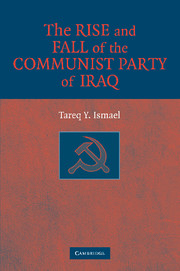Book contents
- Frontmatter
- Contents
- Preface
- 1 The Communist Party of Iraq: Origins and Foundations
- 2 Ascent of the ICP in Iraqi Politics
- 3 Party Rift: The Emergence of the Central Leadership
- 4 Alliance with the Baʿth
- 5 The Rebirth of the Central Leadership in the 1970s
- 6 Crisis: Disintegration or Renewal?
- 7 Conclusion: From Vanguard Activism to Rearguard Opportunism
- Index
2 - Ascent of the ICP in Iraqi Politics
Published online by Cambridge University Press: 24 November 2009
- Frontmatter
- Contents
- Preface
- 1 The Communist Party of Iraq: Origins and Foundations
- 2 Ascent of the ICP in Iraqi Politics
- 3 Party Rift: The Emergence of the Central Leadership
- 4 Alliance with the Baʿth
- 5 The Rebirth of the Central Leadership in the 1970s
- 6 Crisis: Disintegration or Renewal?
- 7 Conclusion: From Vanguard Activism to Rearguard Opportunism
- Index
Summary
The Tripartite aggression of 20 October 1956 against Egypt polarized politics in the entire Middle East region, including Iraq, with national fervor turning into popular political opposition to the West and its Arab allies. Public outrage in Iraq and the demonstrations that followed brought the major opposition parties closer together, and a committee representing the Baʿth, Istiqlâl, NDP, and ICP, and including some independent democratic personalities, was created to coordinate their activities. They formed a special Field Committee to direct the daily demonstrations that were taking place. However, the members of this committee were almost immediately arrested, forcing the Party representatives to take over the tasks themselves. In addition to forming the sub-committee, they established the Supreme Student Committee to direct and mobilize students, who in fact formed the backbone of the protests and who represented the parties. A representative of the KDP was added to this student committee, although the KDP was not officially part of the initial sub-committee.
In response to these developments, NÛrî al-Saʿîd's defiance of the opposition intensified and his oppression increased, particularly of the communists and their sympathizers. This spurred closer cooperation among many of the opposition groupings, and by early 1957 the opposition's solidarity had become a pre-condition for their survival. With some effort, an alliance structure began to take shape, and in February 1957 an umbrella organization, the United National Front, was born.
- Type
- Chapter
- Information
- The Rise and Fall of the Communist Party of Iraq , pp. 71 - 113Publisher: Cambridge University PressPrint publication year: 2007



